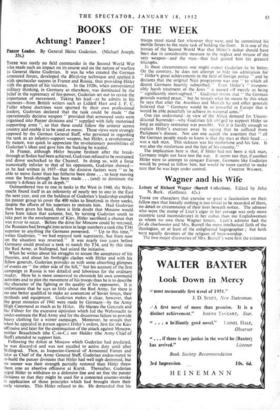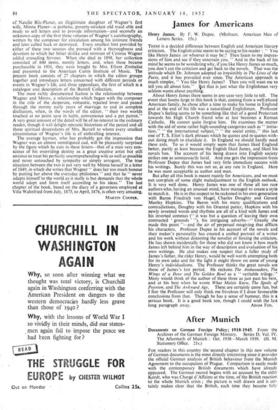Wagner and his Wife
Letters of Richard Wagner (Burrell Collection). Edited by John N. Burk. (Gollancz. 42s.) THERE are characters that exercise so great a fascination on their fellow men that literally nothing is too trivial to be recorded of them, no detail or circumstance of their lives beneath notice. The admirer who wore the stump of Liszt's cigar in her corsage was only more eccentric (and inconsiderate) in her cultus than the Englishwoman to whom we owe these Wagner letters. Liszt's admirer had the foi du charbonnier and Mrs. Burrell the more intellectual faith of the theologian, or at least of the enlightened hagiographer ; but both were equally devotees of the religion of hero-worship.
The two major discoveries of Mrs. Burrell's were first the existence. of Natalie Bilz-Planer, an illegitimate daughter. of Wagner's first wife, Minna Planer—a pathetic, poverty-stricken old maid able and ready to sell letters and to provide information—and secondly an unknown copy of the first three volumes of Wagner 's autobiography, written by the composer for circulation among his intimate friends and later called back or destroyed. Every smallest hint provided by either of these two sources she pursued with a thoroughness and devotion to which her bitter dislike and mistrust of Cosima Wagner added crusading fervour. When she died in 1898, her collection consisted of 840 items, mostly letters, and, when these became purchasable in 1931, they were bought by Mrs. Efrem Zimbalist and presented to the American Curtis Institute of Music. The present book consists of 27 chapters in which the editor groups together and introduces letters concerned with different periods or events in Wagner's life, and three appendices, the first of which is a catalogue and description of the Burrell Collection.
The most richly documented featUre is the relationship between Wagner and Minna, a relationship which began with the composer in the Pile of the desperate, romantic, rejected lover and passed through the stormy early years of marriage to end in complete disillusion, when, in the words of the editor, " their two worlds touched at no point save in habit, convenience and a pet parrot." A very great amount of the detail will be of no interest to the ordinary readers though it will delight operatic historians of the period and all those spiritual descendants of Mrs. Burrell to whom every smallest circumstance of Wagner's life is of enthralling interest.
The average layman, who has probably got the impression that Wagner was an almost unmitigated cad, will he pleasantly surprised by the figure which he cuts in these letters—that of a man very con- scious of his overriding destiny as a great creative artist but still anxious to treat his perfectly uncomprehending wife as well as possible and never untouched by sympathy or simply arrogant. The true situation between the two is put very well by Minna herself in a letter of 1849, in which she writes that Wagner " does her too much honour by putting her above the everyday philistines " and that he " never adapts himself to the world as it really is but demands that the whole world adapt and form itself according to his ideas." The last chapter of the book, based on the diary of a governess employed at Villa Wahnfried from July, 1875, to April, 1876, is often very amusing.
MARTIN COOPER.



































 Previous page
Previous page